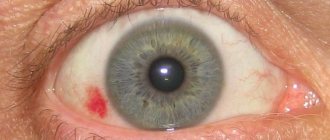Different diseases and conditions sometimes cause the same symptoms. Frequent blinking of the eyes in children occurs due to nervous disorders or as a symptom of eye diseases. Careful observation of the child will tell you the essence of the problem, as well as which doctor should be seen.
Causes of frequent eye blinking in children
Many parents consider their child's frequent blinking to be a bad habit and do not see this as a problem that should be resolved with an appropriate specialist. As a rule, this phenomenon is observed in children aged 4 to 12 years. Since there are many diseases that cause frequent blinking, it is first necessary to determine its causes.
Causes of frequent blinking in children
The most common causes of frequent blinking in children are:
- fright
- blurred vision
- foreign body trapped under the eyelid
- nervous tic
- excessive drying of the cornea of the eye
- concussion and traumatic brain injury
Frequent blinking in a child
It is also possible that frequent blinking may occur after taking certain medications.
When is treatment needed?
Frequent eye blinking in children, the causes of which lie in neurological problems, requires timely treatment. This condition is especially alarming in combination with other tic manifestations. If a child blinks his eyes for more than 3-4 days, he should contact a specialist.
Eye problems also require immediate attention. Frequent blinking can be caused by a foreign object or decreased visual acuity. In such cases, you should not postpone going to the ophthalmologist with your child.
Nervous tics in children - causes
Most often, blinking is a neurological problem. If a child blinks without noticing it, and other involuntary movements or sounds are observed, then such symptoms indicate a nervous tic.
Nervous tics are paroxysmal movements that occur unconsciously and the child does not control them. Although a tic may go away on its own, do not underestimate this condition and, if you suspect a nervous tic, seek advice from a neurologist.
Causes of nervous tics in children
The occurrence of a nervous tic is promoted by:
- hereditary predisposition
- recent infectious disease
- taking any medications and, as a result,
- intoxication of the body
- lack of magnesium, potassium, vitamin B6
- fright
- severe physical or mental stress
- stress
- psychological reasons (overprotection or lack of attention)
- hyperactivity
Preparations: names and instructions for use
Frequent eye blinking in children, the causes of which are caused by neurological problems, is corrected by the following groups of drugs:
- light sedatives - valerian tablets (1 piece per day), “Nota” drops (10 drops 2 times a day), “Persen” (1 tablet 3 times a day);
- replenishing the lack of microelements - “Magne B6” (1 tablet 2 times a day), “Calcium D3” (1 capsule 2 times a day);
- nootropics and antidepressants - Tenoten (1 tablet 2 times a day), Noofen (calculated depending on the weight and age of the child), Zolofart.
It is strictly prohibited to prescribe this kind of drugs (especially the last group) to a child on your own. Only a neurologist can select the necessary medicine for the child, its correct dosage and prescribe the duration of treatment.
Prevention of nervous tics
The occurrence of a nervous tic can be prevented if you properly organize the child’s daily routine, limit the impact of negative factors and promote the child’s positive thinking. It is important to create a friendly, comfortable atmosphere around the child and protect him from various stresses and nervous tension. This can be achieved by providing:
- good sleep
- long walks in the fresh air
- proper nutrition
- moderate mental and physical activity
- yoga and relaxation practices
Prevention of nervous tics in children
It is important to exclude:
- overwork
- long games on the computer
- watching TV for a long time
- drinking coffee
- aggressive, violent TV shows and films
- relationships with conflicting people
It would be a good idea to introduce your child to some kind of sport or hobby that will bring him pleasure and positive emotions.
Motor tics in children
In addition to frequent blinking, nervous tics can be manifested by reflexive motor movements that the child does not control. Such movements can be caused by the contraction of one muscle group or a different one each time, and they can be grouped and affect different parts of the body at the same time. Thus, the child may throw his head back, jump, clench his fingers or unconsciously tap them, sniffle or open his mouth.
Motor tic in a child
Motor tics can go away on their own, but if constant body movements cause discomfort to the child, cause complexes and problems among peers, then you should immediately consult a neurologist. A specialist will help determine the cause of the motor tic and help prevent a similar situation in the future.
Treating Excessive Dry Eyes
Treatment in such a situation is aimed at replacing the volume of tear fluid and combating further pathological transformations. For this purpose, drops, ointments and gels are used that can reduce the evaporation of natural tears and stimulate their production (Natural Tear drops).
Vitamin formulations are also used to better nourish the eyes with microelements and improve blood circulation.
If there is no effect, surgical techniques can be used to restore the natural moist environment of the cornea and get rid of tics.
Parents should not ignore the child's frequent eye blinking. The causes of this symptom may be associated with eye diseases or neurotic problems. Timely diagnosis and well-chosen treatment in these cases will help children avoid more serious consequences in the future.
Article design: Mila Friedan
Blinking eyes in children, treatment
After determining the factors that caused the child to blink frequently, the doctor will determine the measures that should be used for treatment. Since the nature of nervous tics is not fully known and the mechanism of occurrence of these reflex movements is unclear, therapy may include many different medications and physiotherapeutic agents.
Eye blinking in children and adolescents
If a neurologist determines that the cause of the tic lies in some psychological problem, then, most likely, the child will be advised to consult a psychotherapist. In cases where eliminating the cause of tics does not help get rid of them, they resort to drug treatment. As a rule, these are various herbal remedies and sedatives.
Treatment of nervous tics in children
Treatment for tics can be complex and include massage, acupuncture, the use of various herbal remedies that have a calming effect, and yoga. Trainings that teach children to control facial muscles and suppress nervous tics are also effective. In the most severe cases, when the above treatment methods do not bring the desired result, antipsychotic drugs are prescribed.
Frequent blinking is a nervous tic in a child
Treatment for nervous tics that do not go away on their own can be lengthy and difficult. They often tend to occur over a period of time, which can vary from several months to several years. The doctor cannot guarantee a complete cure and that the disease will not become chronic.
Causes of nervous eye tics in children
If the cause of frequent blinking is not a neurological or mental problem, then you need to consult an ophthalmologist. If a child constantly rubs his eyes, strange discharge appears from the tear duct, and the eyeball turns red, the child suffers from an eye disease and there is no point in hesitating in such a situation. Depending on the symptoms, the ophthalmologist will easily make the correct diagnosis and prescribe the necessary medications, and after treatment, frequent blinking, which worries parents and the child, will disappear without a trace.
Additional signs of the syndrome
Frequent eye blinking in children, the causes of which can be both neurological and ophthalmological, may be accompanied by additional symptoms.
For eye problems and dry corneas, the following occur:
- redness;
- tearfulness;
- sensation of burning and pain in the eyes;
- decreased clarity of vision.
Such signs of eye tics indicate the absence of neurological problems.
With tics that require the help of a neurologist, the child may experience:
- excessive aggression;
- impulsiveness;
- tendency to hysterics;
- absent-mindedness;
- inattention;
- hyperactivity;
- the presence of other tics (sniffing, shoulder jerking) or synchronous obsessive rituals.
Eye tics often occur in premature babies, children with ADHD, and children with complex explosive temperaments.
Folk remedies for frequent blinking in children
Treatment of frequent blinking may also include harmless folk methods. As a rule, these are various herbal preparations that will help the child calm down and relieve nervous tension. The most frequently recommended recipes are:
- Soothing decoction - 3 tbsp. l. chamomile mixed with 2 tbsp. l. mint and 1 tbsp. l. valerian root. After pouring one and a half liters of boiling water, infuse the mixture of herbs for 20-25 minutes and drink a glass twice a day. If desired, you can add honey or a slice of lemon to the broth.
Soothing decoction for nervous tics in children
- Herbal collections in pillows - dried lavender flowers are placed in a ready-made or self-sewn bag made of natural fabric (linen, cotton) and placed at the head of the bed. Thanks to this simple method, the child will not only calm down, but will also be able to fall asleep quickly and soundly.
Herbal mixture for calming nervous tics
- If the reason for frequent blinking lies in the fact that a foreign object (a speck of dust, sand, small midges, etc.) has gotten under the eyelid, then a strong decoction of black tea will help to rinse the eye and relieve inflammation. To do this, brew loose leaf tea and let it brew well and cool, after which the affected eye is washed with a moistened swab.
Frequent eye blinking in children. Komarovsky E.O.
Popular Ukrainian pediatrician Evgeniy Olegovich Komarovsky claims that the most common cause of blinking in a child is a psychological problem. He does not advise parents to attribute such a pathology to pampering and grimacing, otherwise there is a huge risk of missing a serious illness in the future. But you should not focus much attention on blinking: it would be wrong to interrogate the child in order to find out why he blinks often - this can aggravate the problem.
Dr. Komarovsky about frequent blinking in children
Komarovsky advises monitoring the child’s condition for 2-3 days; if the tic does not go away on its own during this time, then you should immediately consult a doctor. A consultation with a neurologist and psychotherapist would be optimal, but a lot also depends on the parents. It is necessary to create a favorable, comfortable atmosphere in the house and eliminate all factors that cause mental stress and nervousness in the child.
Other advice from doctors regarding the treatment of frequent blinking in children can be found by watching the video:
Diagnostics
To determine the cause of frequent eye blinking, it is necessary to visit both a neurologist and an ophthalmologist.
| Oculist | The examination begins with interviewing the patient and studying the anamnesis. The doctor evaluates visual acuity, visually examines the eyelids, and uses a biomicroscope to look at the condition of the tear film. If necessary, a full ophthalmological examination is prescribed (the volume of tear fluid and the rate of its evaporation are examined) |
| Neurologist | Studies the history of the mother's pregnancy and the progress of childbirth, illness of the child. Visually examines the child and his reflection. Tests may be prescribed to determine the level of certain elements in the blood, as well as to determine the presence of roundworms. Brain examinations can reveal disorders of the central nervous system (epilepsy, tumors). |
https://www.youtube.com/watch?v=R20p2-aH3UM











